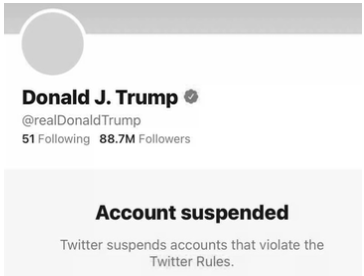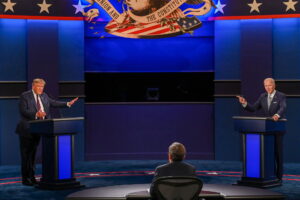Tag: Trump
The Question that Trumps All: A Grand Return to Twitter?
by Christina Charie '25 on November 3, 2022
Opinion Editor
Opinion

In the wake of Elon Musk’s Twitter takeover, America is left wondering if former President Trump will be allowed to return to the platform. Musk has alluded to this action throughout his negotiations with Twitter, which has Trump anxiously awaiting his grand return to the social media network. Now that the Tesla founder officially owns Twitter, Musk has reportedly fired staff members responsible for suspending Trump, which raises speculation surrounding the issue.
With midterm elections rapidly approaching, reinstating Trump’s Twitter account could have serious ramifications.
It is clear that the former president can mobilize large groups of people by claiming election results are fraudulent. Whether or not these claims are founded upon accurate evidence, Trump’s rhetoric influences large numbers of people to take unprecedented action. His tweets on Jan. 6, 2021, were a major catalyst for the riots on the Capitol that took place.
Trump’s return to Twitter could result in another Jan. 6 scenario. Two consecutive unpeaceful transitions of power after elections would further polarize the nation, making collaboration between parties out of reach.
The former President has been subpoenaed by Congress because of his actions on Jan. 6. Additionally, the subpoena specifically requests electronic communications related to Trump’s actions on that day. No president is above the law, but Trump would certainly use Twitter to convey otherwise. Musk would put members of the select committee in danger if he reinstates Trump’s Twitter account.
Recently, Steve Bannon, a former Trump administration member, has been sentenced to prison time for ignoring a Congressional subpoena. Former President Trump should face the same consequences if he chooses to ignore his subpoena. If Trump is allowed to tweet once again, his previous behavior indicates that he will continue to promote his agenda, even if it puts others in harm’s way.
While many, including Trump himself, argue that banning him from social media is a violation of the First Amendment’s freedom of speech clause, the right does not protect individuals who knowingly scream “fire” in a crowded public space. Metaphorically, this is exactly what the former president has done.
The recent attack on Paul Pelosi, the Speaker of the House’s husband, foreshadows the consequences of social media being used as a catalyst for polarization within American politics. Make no mistake, there is a clear reason why this occurred less than two weeks before the election.
Disagreement and debate are inherent features of any democracy. Attacking the Speaker’s immediate family member and fracturing his skull is not. Ultimately, the Constitution protects only non-violent protest and organization.
Trump’s consistent public shaming of particular politicians that disagree with his viewpoints, including Nancy Pelosi, makes them targets for violence and harassment. Upholding democratic checks and balances as outlined in the Constitution is not justification for violence, even if one disagrees with the course of action.
Donald Trump Jr.’s actions on social media in response are only perpetuating radicalization and political violence. The post, which can be found on Truth Social, is a picture of a hammer and a pair of underwear with the caption “Got my Paul Pelosi Halloween costume ready.” This response is incredibly insensitive given that Pelosi suffered from a fractured skull that required surgery. All acts of political violence should be taken seriously instead of utilized as a comedic opportunity.
By continuing to use social media in a toxic manner, the Trumps consistently prove that they are unwilling to change despite the horrific consequences.
No matter the party affiliation, everyone should hold officials accountable for their actions online by demanding a formal public apology from the Trumps. Ignoring these issues sets a dangerous precedent for future leaders while putting American democracy on an uncertain path. Like any other American that receives a subpoena, the public should expect former President Trump to cooperate with the investigation.
America cannot deliver justice unless all individuals are subject to the law, including those in power.
Bursting the PC Bubble: Takeaways from the First 2020 Presidential Debate
by The Cowl Editor on October 15, 2020
National and Global News

by Addison Wakelin ’22
News Staff
Less than a month away from the 2020 presidential election, the first presidential debate left many Americans in a state of pessimism and uncertainty about the future of the United States.
On Tuesday, Sept. 29 in Cleveland, former Vice President Joe Biden and President Donald Trump faced off in a brutish debate during one of the most unprecedented times in modern U.S. history. The debate was moderated by Fox News anchor Chris Wallace.
Although the debate became somewhat personal given Trump’s jeers and ad hominem attacks against Biden and his family—especially Hunter Biden—the two debated on some important topics pertaining to the United States. The debate can be broken down into several important topics, picked by Wallace, including the Supreme Court vacancy, the COVID-19 pandemic, protests and violence in cities as a result of the issue of racism, and the economy.
Following the tragic death of former Supreme Court Justice Ruth Bader Ginsburg, the Supreme Court vacancy has become a point of interest for Republicans. Less than two weeks after RBG’s death, Trump announced he would nominate Amy Coney Barrett to the Supreme Court.
Several Republicans, including South Carolina Senator Lindsey Graham and Kentucky Senator Mitch McConnell, have been criticized for their hypocritical comments on blocking Obama’s nomination of Merrick Garland to the Supreme Court in 2016, claiming it would be unfair to Americans to vote for a justice during an election year.
Biden countered Trump’s claims, warning that Barrett’s potentially successful nomination will solidify a 6-3 conservative majority in the Supreme Court. As a result, Republicans will be able to repeal Roe v. Wade and the Affordable Care Act, unraveling years of progressive lawmaking that could strip away healthcare accessibility and benefits for many Americans, especially women.
COVID-19 also became a major point of discussion during the debate. Trump has been criticized for holding several rallies without masks or social distancing enforcement, as the U.S. has surpassed 215 thousand coronavirus deaths. Trump taunted Biden during the debate for his mask-wearing, saying, “I don’t wear a mask like him. Every time you see him, he’s got a mask. He could be speaking 200 feet away from you and he shows up with the biggest mask I’ve ever seen.”
Less than 72 hours after the debate, on Oct. 2, Trump announced he tested positive for COVID-19. He tweeted: “Tonight, @FLOTUS and I tested positive for COVID-19.” Trump was promptly hospitalized at Walter Reed Hospital and treated with an experimental antibody treatment, steroids, and oxygen. He has since been released.
Perhaps the most shocking part of the debate was Trump’s failure to condemn white supremacists. Wallace challenged Trump, asking if he is willing to “condemn white supremacists and militia groups.” Both Wallace and Biden pushed Trump to condemn white supremacists. After asking for a specific group to condemn, Biden suggested the Proud Boys, a far-right, fascist organization that spouts anti-Semitic, Islamophobic and other bigoted rhetoric.
Trump stated, “Proud Boys, stand back and stand by.” Trump’s comments caused an uproar. “Stand back and stand by” suggests that these groups wait for his command and is not a condemnation of their actions.
The debate left one question: who won? For many Americans, the answer is no one. The nation is at a standstill between polarizing political beliefs and a chaotic year defined by a pandemic and socio-racial upheaval.
Many viewers felt as though the true loser of the debate was the United States itself. Between the U.S. nearing almost 220 thousand coronavirus deaths, millions of Americans having filed for unemployment and facing eviction since the pandemic started, and growing social unrest, the U.S. faces a desolate political landscape.
Only time will tell if the U.S. can muster the strength and unity necessary to overcome the hardships that have plagued this country.
After Trump’s COVID-19 diagnosis, the Commission on Presidential Debates decided that the second presidential debate, initially scheduled for Oct. 15, would be canceled, citing Trump’s refusal to participate in a virtual debate.
Both candidates have instead opted to host their own respective virtual town halls on Oct. 15 at 8 p.m., with NBC covering Trump’s town hall and ABC covering Biden.
The next debate is scheduled for Thursday, Oct. 22 in Nashville, moderated by NBC’s White House correspondent Kristen Welker.
Election of 2020: Impeachment Trial Goes to the Senate
by Kyle Burgess on January 30, 2020
National and Global News

by Nicole Silverio ’22
This week, opening arguments began in the Senate regarding the House of Representatives’ impeachment of President Donald Trump. Both Democrats and Republicans have spent the last week making their case of whether r not to remove President Trump. After both sides has the opportunity to ask questions, they will vote on whether or not to subpeona witnesses not yet heard in the investigation.
On December 16, 2019, the House Judiciary Committee released a report explaining the charges against the President. The charges against him are abuse of power and obstruction of Congress. The Democratic Party, led by Speaker Nancy Pelosi, has accused President Trump of obstructing justice for contacting the Ukrainian president to investigate his political rival’s son. In October, the Intelligence, the Oversight and Foreign Affairs committees deposed witnesses involved with Ukrainian foreign policy testifying that Trump wanted the Ukrainian president, Volodymyr Zelensky, to publicly announce investigations into Joe Biden’s son, Hunter Biden and Burisma, a Ukrainian natural gas company that Biden had served on the board of until 2019.
On December 18, 2019, the House of Representatives held a trial in which the representatives held hearings, the Democrats supporting impeachment and the Republicans against it. The final vote was largely along party lines, with all Republicans and three Democrats voting against the impeachment, while the majority of Democrats voted for impeachment, officially impeaching the president.
Speaker Pelosi sent the articles of impeachment to the Senate, where senators have been arguing for or against the president. Pelosi has named seven Democratic members of Congress as the managers who will argue for impeachment. “What is at stake here is the Constitution of the United States” said Pelosi during a press conference. According to Tucker Carlson, host of Fox News’ Tucker Carlson Tonight, Senator Chuck Schumer explained that “even with no chance of removing President Trump at the end of the process, impeachment is still absolutely necessary for this country, and every other problem we face must go on hold to pursue it.”
Senate Majority Leader, Mitch McConnell, is setting rules for the chamber to vote on. Democrats have requested witnesses in the trial, but McConnell has refused this request. Republican senators delayed the vote to subpeona witnesses until after arguments have been made.
President Trump reported that he looks forward to having his due process in the Senate, the majority of which is Republican. Republican Senator Roy Blunt of Missouri told CNN, “Our side has not changed our view on this. I think where House Democrats failed, and maybe Senate Democrats failed, were trying to use the time in a way that would wear us out and deny the president’s team any response this week.” Contrary to the senator’s opinion, CNN editor at large, Chris Cillizza, claims that 1 in 3 Republicans (32 percent) believe Trump has committed illegal acts either before or during his presidency. Despite their beliefs, the majority of them are willing to back Trump, believing he should not be removed from office.
Chairman Jerry Nadler accused Republicans of covering up President Trump’s crimes, claims to which the president’s lawyers, Pat Cipollone and Jay Sekulow, retaliated against. He has been accused by several Republican senators as being “especially partisan.” Adam Schiff, one of the impeachment managers, told CNN that “The President late last night bragged that he had the material. Indeed, they do have the material hidden from the American people. That is nothing to brag about. If the senators are serious about wanting to learn all the facts, if the President’s team wants to contest any of the facts, these documents and witnesses will need to be produced.” Democrats, to the dismay of Republicans, are desperately trying to withhold four Republican votes to obtain evidence and witnesses.
Due to the House Democrats’ vote last month, President Trump must endure the 2020 election through his impeachment, and may run against the political rival who he has had investigated. The question open for debate is whether President Trump’s impeachment will harm him or benefit him this upcoming November 3. The American people will either desire to vote an impeached president out of office, or turn their anger towards the Democrats for bringing the impeachment trials to life to begin with, perhaps believing that the impeachment has turned heads away from the real issues facing our nation. Only time will tell.
Bursting the PC Bubble: New Tariffs on Steel and Aluminum Imports
by The Cowl Editor on December 5, 2019
National and Global News

by Matthew Mazzella ’20
News Staff
On Monday, December 2, President Donald Trump announced the implementation of tariffs on steel and aluminum goods from Brazil and Argentina. The move to impose these fees will break a previous agreement established between the U.S. and the two countries and adds to the global trade war that is currently being fought with China.
In 2018, the United States reached an agreement with Argentina and Brazil regarding the amount of steel they would be able to import into the United States, but this move shows that neither country was safe from Trump starting a trade war.
President Trump shared the following statement in a tweet on Monday explaining the sudden move to implement tariffs. Trump tweeted, “Brazil and Argentina have been presiding over a massive devaluation of their currencies, which is not good for our farmers. Therefore, effective immediately, I will restore the Tariffs on all Steel & Aluminum that is shipped into the U.S. from those countries.”
While it is unknown why the President reversed the agreements from 2018 so abruptly, it is believed that the Brazilian currency falling to an all time low last week and Argentina’s economic crisis have led to America restricting the amount of business done with the countries. If the tariffs are upheld, they will impose damage to South America’s largest economies. Currently Brazil is struggling with high unemployment while Argentina is in the midst of a recession.
While this seems like a move that will benefit the American economy, specifically steel companies across America, other industries will end up having to pay more for the steel they need to purchase from outside the country. American manufacturers of automobiles and machinery products are slated to pay more for the materials they must use for production.
Many financial analysts believed that Trump would scale back on creating trade tensions in order to stabilize the economy enough to win him a second term. Monday’s new trade tensions are starting to prove this theory wrong and is pointing towards the belief that these tariffs can be a continuous part of the President’s term in office. On Tuesday, Trump warned that the trade wars could go beyond the 2020 election, sending the Dow Jones Industrial Average down more than 400 points.
This move follows a myriad of unpredictable moves by the Trump Administration and adds a few more names to the list of participants in the trade war. Time will tell what the effects of these tariffs will be and the implications they will have on world markets and economies. It has become abundantly clear that the President wants to keep production of goods on home soil, but this is coming at the expense of other countries and businesses through the implementation of tariffs on imported and exported goods. Trump’s adamancy on imposing tariffs on foreign goods has sent markets into extremely volatile conditions, as each tweet can have a positive or negative effect on the stock market on any given day.
